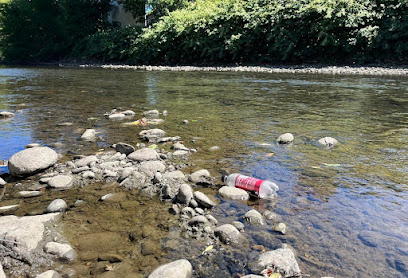Few materials are as ubiquitous as plastics, in their many forms, because the same traits that make them useful make them long-lasting and difficult to reprocess. So they accumulate in the environment, in many ways.
It’s hardly surprising that the PennEnvironment Research & Policy Center found an array of plastic pollutants in all 50 waterways that it tested in Pennsylvania over the past year, including the Lackawanna and Lehigh rivers, Roaring Brook and Green Run.
Locally, all four waterways contained plastics in three of the four categories for which researchers tested: microfibers from textiles; microplastics from harder plastic goods and feedstocks; and microfilm from single-use bags and other packaging.
The researchers did not find microbeads from cosmetic products, which have emerged as a major pollutant around the world.
Although the proliferation of waste plastic is nothing new, the report was alarming because the researchers specifically targeted 50 streams that the state Department of Environmental Protection had categorized as the cleanest and best-maintained waterways across the state.
Activists who have worked hard for decades to improve local waterways, especially the Lackawanna River, expressed dismay at the findings.
“It seems like it never ends,” said Charlies Charlesworth, a member of the state Fish and Boat Commission and past president of the Pennsylvania Council of Trout Unlimited.
“We’re killing ourselves with this stuff,” added Bernie McGurl, founder and executive director of the Lackawanna River Conservation Association.
Advocates called for state policy changes to reduce plastic pollution, but it’s a particularly heavy lift in Pennsylvania.
For years, the Legislature prevented local governments from banning plastic bags to protect a bag manufacturer in a key legislative district.
Fortunately, it allowed that prohibition to lapse this year and several cities have banned plastic bags or are in the process of doing so. And major retailers, including Wegmans, have eliminated plastic bags in favor of paper or reusable bags.
But the state government not only tolerates plastic pollution, it fosters it by subsidizing plastic manufacturing as a gift to the natural gas industry.
The Legislature has approved about $1.7 billion in tax credits for a Shell petrochemical refinery in Beaver County that produces plastic pellets from ethane.
A fundamental law of economics is that the more the government subsidizes something, the more it is produced.
Pennsylvanians can expect ever more plastic pollution until the government puts a price on it rather than pays for its production.
NewsClips:
-- Scranton Times: Study Finds Microplastic Pollution In NE PA’s Cleanest Waterways
-- TribLive Editorial: State Fines Should Be Higher Than Tax Cuts To Penalize Environmental Leaks [PaEN]
-- Republican Herald Editorial: State Lawmakers Should Adopt Rules That Preclude State Taxpayers From Subsidizing Pollution From Oil & Gas Industry [PaEN]
-- Citizens Voice Editorial: State Insists On Paying Polluters [PaEN]
-- PennLive Guest Essay: Tax Credit Bill Gifts Natural Gas, Dirty Hydrogen With $4 Billion In Taxpayer Subsidies - By Patrick McDonnell, PennFuture
Related Articles - No Protection For EV, HQ Streams:
-- NO SPECIAL PROTECTION: The Exceptional Value Loyalsock Creek In Lycoming County Is Dammed And Damned - Video Dispatch From The Loyalsock - By Barb Jarmoska, Keep It Wild PA [PaEN]
-- Exceptional Value Water Quality Designation, State Forest Land, River Honors Were Not Enough To Protect Loyalsock Creek From Natural Gas Drilling & Pipelines In Lycoming County - By Friends Of The 'Sock [PaEN]
-- Susquehanna River Basin Commission Has No Exclusion Zones For Water Withdrawals From Any Streams, Including EV Or HQ Streams Subject To Water Quality Antidegradation Rules [PaEN]
Related Articles This Week:
-- DEP Permit Notices -- Oil & Gas Industrial Facilities [PaEN]
-- Senate, House Pass Massive, 20-Year Taxpayer Subsidies For Natural Gas, Hydrogen And Petrochemical Industries In Hours With No Public Accountability Or Environmental Safeguards [PaEN]
-- Citizens Voice Editorial: State Insists On Paying Polluters [PaEN]
-- Bill Goes To Governor Creating Well Plugging Grant Program; Senate, House Again Fail To Address Woefully Inadequate Conventional Well Plugging Bonding [PaEN]
-- Senate Committee OK’d Bills Rebranding Fossil Fuels As ‘Low Emission,’ Eliminating Incentives For EVs; Fails To End Ban On Raising Conventional Oil & Gas Well Bonding; Reports Out EHB Nominee Sarah Clark [PaEN]
-- Pine Creek Headwaters Protection Group: Potential Impacts Of Shale Gas Development Forest Fragmentation On Tioga State Forest Birds - By Dr. Robert M. Ross [PaEN]
-- DCNR Leased 176 Acres Of Susquehanna River Submerged Land To SWN Natural Gas Production Company In Susquehanna County For $704,000 [PaEN]
-- Public Herald: Public Records Show PA Has 10,543 Injection Wells Where Conventional Oil & Gas Drilling Wastewater Is Often Used For Enhanced Recovery Of Oil & Gas
-- Penn State Research: PFAS 'Forever Chemicals' Persist Through Wastewater Treatment, May Enter Crops - By Penn State News [PaEN]
-- A Study Finding Microplastics In 100% Of Exceptional Value, High Quality, Class A Trout Streams Sampled In PA Is Disturbing To Wildlife Advocates [PaEN]
-- National Fuel Gas Requests PUC To Approve 9.2% Increase In Base Delivery Charge; Separate Cost Of Gas Up 127.8% Since May 2021 [PaEN]
-- Ohio River Valley Institute Blog: Natural Gas Costs Are Principal Driver Of Current Inflation; Increasing Gas Production For Export Also Increases Prices And Volatility
[Posted: October 29, 2022] PA Environment Digest


No comments :
Post a Comment